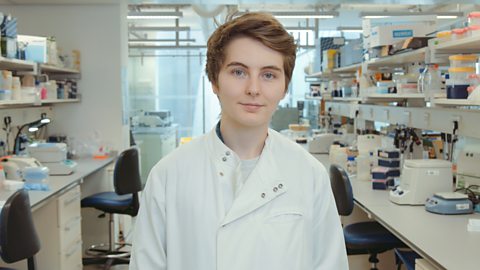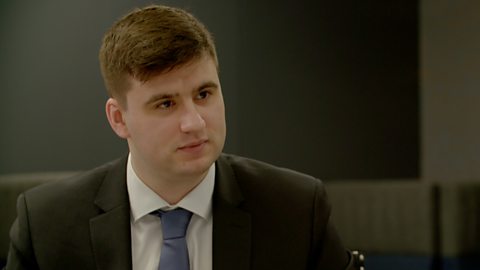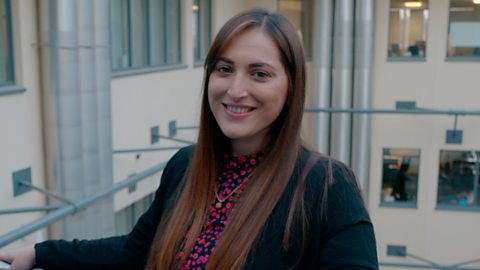Meet Lucinda, 29, a forensic scientist working for the DNA Analysis Service at King's College London University. Find out more about her job and journey into the role.
Part of our Bitesize world of work series.
I apply science to solve mysteries.
Lucinda:
My name is Lucinda, and I'm a forensic scientist. I apply science to solve mysteries.
Forensic science is the application of science to the law. So, a forensic scientist will carry out scientific investigations into samples or evidence, to try and find some information that could potentially help a judge or a jury make a decision in court.
As a forensic scientist day-to-day, I will be analysing samples, and samples can come in many different forms. It might be a cheek swab, a blood spot, hair, saliva, so my job is to carry out DNA tests on these samples, and this is to try and gain genetic information.
This genetic information is used to build a DNA profile. Everyone's DNA profile is unique, with the exception of identical twins, but components in our DNA profile can be shared amongst genetic relatives. So DNA analysis can tell us something about an individual, but also about who they're related to.
My advice for someone who wants to become a forensic scientist is to make sure that you have a good background in science. This is at school, at university, make sure that you enjoy science. The next thing I would say is make sure that you build up lab skills wherever you can. Understanding good laboratory practice is really, really important for being a forensic scientist.
If you don't know what type of forensic scientist you want to be, then just do a generally broader degree, that's no problem. You don't have to study forensic science at undergraduate level, to be a forensic scientist.
Alongside my role as a forensic scientist, I'm also currently carrying out a PhD, which means that I'm developing my research skills. So after I finish my doctorate I'm hoping that this means that I can combine my research skills with my forensic case work skills, to specialise in particular areas, going forward.
Denise, supervisor:
Lucinda is a very determined and resourceful person, so she will be proactive in what she does. Her research for example, she doesn't just do what we say that she should be doing, she's thinking about it, and she's thinking about how to present it in a better way, how to take it further.
Lucinda:
Forensic science covers a lot of disciplines, so you can be a DNA forensic scientist, you can be a drug analyst, you can be a fingerprint analyst. So if you like the idea of being a forensic scientist, then maybe focus on just an area of science that you're interested in, and then you can look at developing your forensic skills later on.
What I love most about being a forensic scientist is the variability of my job. Even though the scientific procedures I use on a day-to-day basis are the same, a particularly complex case might give unexpected results. I always like to get to the bottom of a puzzle.
- Lucinda works in a laboratory carrying out scientific investigations to reveal information about evidence from a crime scene.
- Lucinda specialises in testing and analysing DNA samples to find information and data that can help a jury or judge during a court case.
- She processes samples using scientific procedures, then interprets the results and contributes to reports.
- The main skills and attributes Lucinda uses in her role include research skills, attention to detail, integrity, and curiosity.
- She did A-levels in Maths, Biology and Chemistry before studying Biochemistry at university.
- In her third year, she took the forensic science module which increased her interest in the role.
- Lucinda has also volunteered in a lab as part of a police team.
- Alongside her work, she's studying for a PhD in Forensic Genetics. Once completed, Lucinda will be able to use her research skills to specialise in certain areas using new techniques.

Top tips
- Research the different specialisms as career paths can be varied.
- Get work experience so you can see what the work is like first hand.
- Work hard at science in school. Even if you don't get top results, you can do a generalised science exam and still be accepted onto a forensic science course.

What to expect if you want to be a forensic scientist
- Forensic scientist average salary: £18,000 to £45,000 per year.
- Forensic scientist typical working hours: 37 to 40 hours per week.
What qualifications do you need to be a forensic scientist?
You could get into this role via a university course, an apprenticeship, or applying directly.
Sources: LMI for All, National Careers Service.
This information is a guide and is constantly changing. Please check the National Careers Service website for the latest information and all the qualifications needed.
For careers advice in all parts of the UK visit: National Careers Service (England), nidirect (Northern Ireland), My World of Work (Scotland) and Careers Wales (Wales).

Jaz: research scientist. video
Jaz is a research scientist and PhD student.

Fraser: trainee solicitor. video
Fraser is a trainee solicitor advising businesses and people on different areas of the law.

Sanna: trainee detective. video
Sanna is a trainee detective investigating serious crime with South Wales Police.
